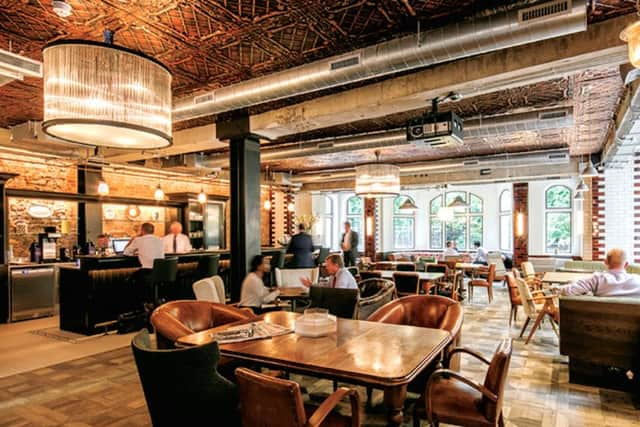BGF aims to nurture next generation of innovators


Since it was launched five years ago, BGF (Business Growth Fund) has invested £1 billion of growth capital in fast-growing businesses. The first thing it looks at when making investment decisions, is the team behind the business plan. “The hard part about innovation isn’t always coming up with the idea – it’s about getting that idea to market and keeping it there,” says Patrick Graham of BGF.
“A thousand times more effort can go into hiring the right people, inspiring a team and delivering a stand-out marketing strategy than having the original idea. Not everyone has the skills, talent and tenacity to get that part right.”
Advertisement
Hide AdAdvertisement
Hide AdBGF was founded by five of Britain’s biggest banks – Barclays, HSBC, Lloyds, Royal Bank of Scotland and Standard Chartered – with £2.5bn to invest in companies run by ambitious entrepreneurs. It typically pumps in between £2 million and £10m in return for a minority equity stake.


The company knows that it’s not enough just to think about the entrepreneurs of the present though. It also needs to consider who will be the next generation of innovators and disruptors.
Part of BGF’s work in this area includes its support for the New Entrepreneurs Foundation (NEF), which was created in 2010 to offer final year students, recent graduates and non-graduates a direct route into earlier stage businesses.
The NEF’s founders were BGF chairman Sir Nigel Rudd, former UBS investment banking vice chairman Oliver Pawle, former trade minister Lord Davies of Abersoch and executive coach Dee Stirling.
Each year, the foundation selects around 30 aspiring entrepreneurs from more than 1,000 applicants to take part in a one-year programme that combines real-life experience in fast growing businesses with intensive training and mentoring.


Participants benefit from advice given by a business mentor and an executive coach.
The training programme includes: a paid work experience placement; a ten-month fast-track programme with workshops delivered by companies such as Deloitte, McKinsey and Tesco, and academics from the London Business School, University College London and the Centre for Entrepreneurial Learning at Cambridge Judge Business School.
There are monthly speakers and networking events with entrepreneurs like Lastminute.com co-founder Brent Hoberman, Carphone Warehouse co-founder Sir Charles Dunstone, business angel Sherry Coutu and UK government adviser Lord Young of Graffham.
Advertisement
Hide AdAdvertisement
Hide AdSo far, its six cohorts have produced 155 alumni who together have set up 62 ventures, created more than 660 jobs and generated in excess of £10m in seed funding.
BGF’s support for the project has included hosting one of the new entrepreneurs and participating in the NEF’s events.
The aim is to fast track the participants’ careers and equip them with not only the hard and soft skills to start, run and grow their own company, but also an invaluable network.
Importantly, they come from a vast array of backgrounds: school leavers, fresh graduates, engineers, humanities students and many who have experience in business already.
Their ideas are equally diverse. Last year’s proposals included healthy soft drinks, a new biofuels technology, a business-to-business procurement service and a new mobile advertising concept.
These are still early days for NEF, but already graduates from the first years of the programme are successfully raising funds and real businesses are being created.
As well as working with students and graduates, BGF is helping to ignite the spark of entrepreneurialism in school pupils. The fund is the headline sponsor for Tenner Challenge, a competition run by Young Enterprise Scotland and Young Enterprise south of the Border.
The contest challenges young people aged between 11 and 17 to think like entrepreneurs.
Advertisement
Hide AdAdvertisement
Hide AdThey are each given £10 and are invited to come up with a business idea and then make it happen using their seed funding.
As the headline sponsor for the competition, BGF investors sit on the judging panel – evaluating the weekly competitions based on sales pitches, trade stands and more – as well as the national competition. Registration for the 2017 Tenner Challenge opened on 28 November, with the competition due to kick off on 27 February.
South of the Border, BGF is also involved with supporting the National Citizen Service (NCS), which gives young people in England and Northern Ireland aged between 15 and 17 the chance to gain skills for work and to take part in social action projects.
Under the scheme, school pupils and other young people are given the chance to visit offices to learn more about the world of work.
Helping young people to develop the skills they need for work is a subject that’s close to the hearts of many members of staff at BGF.
The fund encourages its staff to take part in the Inspiring the Future scheme, which involves employees from all sectors and professions volunteering to visit schools and colleges to talk about their jobs, careers and the qualifications and experience needed to get there.
Volunteers also help young people to prepare their cvs and develop effective interview skills.
Some of the support the fund offers is less formal – members of staff visit schools to talk about their work, spend time mentoring pupils, and host student visits to its offices throughout the country.
Advertisement
Hide AdAdvertisement
Hide AdThe support that BGF offers to young people mirrors the backing it gives to the entrepreneurs who run its portfolio companies.
As well as providing finance, the fund gives entrepreneurs access to its Talent Network, a group of more than 2,000 board-level contacts throughout the UK who are on hand to share their experience and offer advice.
“Everybody needs advice at one stage or another, no matter whether you’re a new entrepreneur just starting out in business or an experienced pair of hands already running your company,” says Graham. “Being able to tap into a wide network of talent is one of the real strengths for BGF.
“Being able to offer that same kind of support and encouragement to people starting off their journey as entrepreneurs is a great feeling. Business is all about people and so it’s important to give something back to the community.”
Green credentials at BGR head office are a licence to thrill
When BGF moved into its head office at Watergate House in London, it was taking over the stewardship of a building with an illustrious history.
The Edwardian structure near the Embankment was the original home of the Government Code & Cypher School – know better known as Government Communications Headquarters or GCHQ – when it was established in 1919, before it moved to its more famous base at Bletchley Park during the Second World War.
Moho London, the company that designed the interior of BGF’s new head office, took inspiration from the 1940s and Alan Turing’s codebreaking teams.
Advertisement
Hide AdAdvertisement
Hide AdWhile the interior of the office may hark back to the building’s past – with exposed bricks and leather settees – BGF has brought its environmental credentials bang up-to-date.
The fund has installed motion-activated lights, mixed recycling and water saving devices to help lessen the building’s impact on the environment.